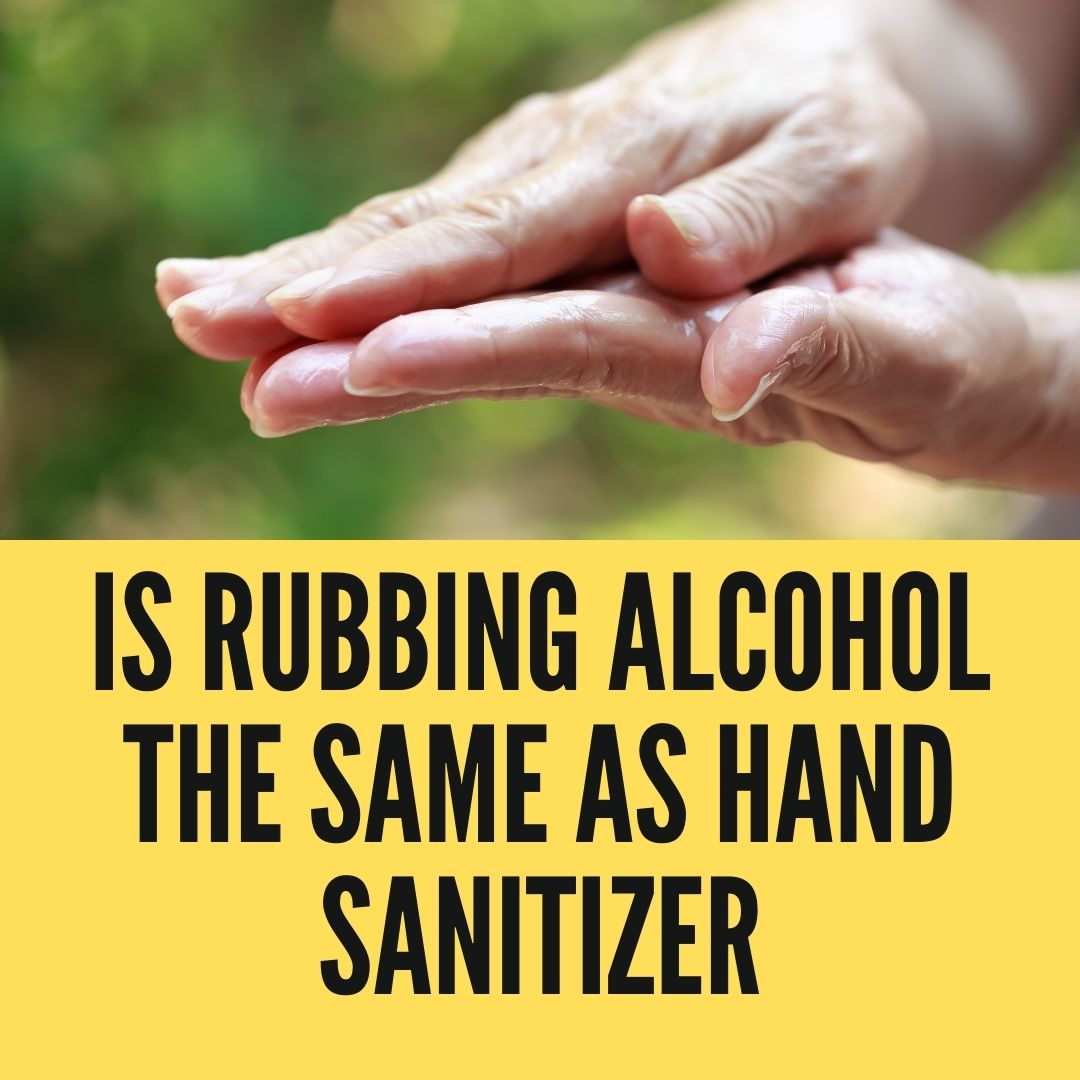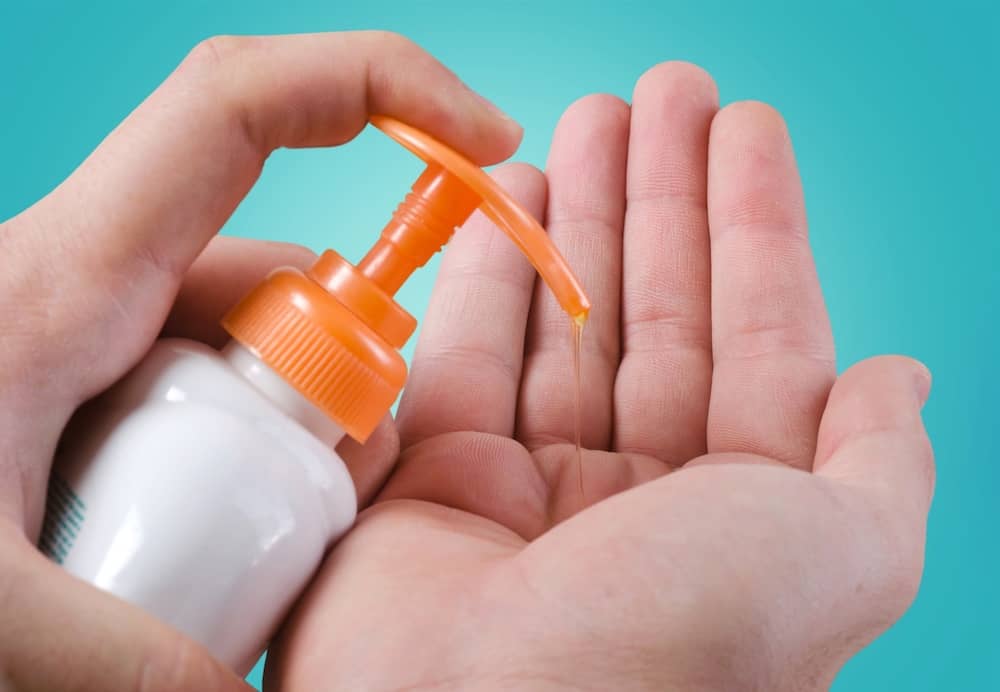
In March 2020, the COVID-19 Coronavirus hit the world like a tidal wave. Within a few short weeks, what started as a small virus had turned into a full-scale global pandemic.
Entire countries shut down, billion-dollar corporations went bankrupt overnight, and millions were infected.
In the early stages of the virus, everybody was terrified of contracting it, and the CDC recommended constant hand-washing and hand-sanitizing.
Naturally, store shelves sold out of hand sanitizer (and toilet paper) overnight. While some resorted to ordering it online, there was a shortage there as well, leading others to create their own forms of hand sanitizer.
Is rubbing alcohol the same as hand sanitizer? While rubbing alcohol is not the same as hand sanitizer, it does share a lot of the same properties. They’re both antibacterial, can kill viruses, and are commonly used in the medical field as an all-purpose sanitizer.

Today, I’m going to break down some of the differences between rubbing alcohol and hand sanitizer and discuss some of the pros and cons of using alcohol as a substitute for sanitizer.
Difference Between Rubbing Alcohol And Hand Sanitizer?
The main difference between isopropyl rubbing alcohol and hand sanitizer is consistency.
Standard isopropyl rubbing alcohol can be purchased at your local pharmacy or grocery store in the first aid section.
It’s commonly used as a topical antiseptic, an all-purpose cleaner, and has a wide variety of other random uses. It’s almost always pre-diluted with water and has a concentration of 50% to 90% alcohol to water.
When purchased from the store, hand sanitizer is also diluted to a similar concentration. Most sanitizers are a mixture of around 60% pure alcohol and 40% other ingredients.
These other ingredients are usually synthetic gels that hold the mixture together and make it easier to spread over your hands.
One of the biggest differences between rubbing alcohol and hand sanitizer is that most sanitizers contain a moisturizing agent, usually Aloe Vera or Vitamin E.
This prevents your hands from getting too dried out from all of the alcohol, which pulls a lot of the natural oils out of your hand and can leave them feeling dry.
Ethyl Alcohol vs. Isopropyl Alcohol
Due to increased demand for both hand sanitizer and rubbing alcohol, it quickly became hard to find both.
As a result, a lot of farms and alcohol distilleries repurposed their facilities to produce another form of alcohol- Ethyl Alcohol or [ethanol].
Ethanol is manufactured from distilling grain sugars and produces a form of alcohol that shares many of isopropyl alcohol’s antibacterial properties.
However, it’s not as toxic. Grain alcohol is actually consumed in lower concentrations as an alcoholic beverage (commonly known as Everclear).
This led to a lot of ethanol-based hand sanitizers hitting the market. While both forms of alcohol are almost equally as effective as far as sanitation goes, ethyl alcohol tends to dry the hands out more than isopropyl alcohol.
While this might be great for building “guitar hands,” most people don’t want dry fingers. For this reason, isopropyl alcohol is better for topical applications.
Aside from this one thing, though, both work well when it comes to denaturing virus proteins.
Is Rubbing Alcohol Better For Sanitizing Than Washing Your Hands?
For the entire year of 2020, we were bombarded with hand sanitizer. Almost every online and brick-and-mortar store in the country was selling it. Even if we weren’t buying it, the news was always talking about it.
Americans (including myself) got so caught up in the hype that we almost forgot about good old-fashioned hand washing. That was a mistake.
According to the CDC, washing your hands is almost always more effective at removing bacteria and germs than sanitizing your hands with rubbing alcohol or hand sanitizer.
Experts recommend using sanitizer primarily when you aren’t in a position to wash your hands.
The reason is that hand sanitizer is not as effective when there is dirt, grease, and grime on your hands.
The grease on your hands can trap bacteria beneath it, sealing it in and giving it a protective layer where it can “hide” from the sanitizer. Soap, on the other hand, is able to fully remove the dirt and wash away all of the germs underneath.
Can I Use Rubbing Alcohol As A Hand Sanitizer?
Since hand sanitizer can often be hard to find in stores these days, one of the top questions on the internet is if rubbing alcohol can be substituted as a hand sanitizer.
The basic answer is yes, it can. However, there are a few associated pros and cons that should be mentioned.
Pros And Cons Of Rubbing Alcohol As A Sanitizer
The main advantage of using rubbing alcohol to sanitize your hands is that it’s easy to find. In fact, if you’re reading this article right now, it’s probably because you ran out of sanitizer, and you have a bottle of rubbing alcohol in your cabinet.
Another advantage of rubbing alcohol is that it’s easy to work with. Since it’s not as viscous (thick) as hand sanitizer, you can stretch it a lot farther. With rubbing alcohol, a little bit goes a long way.
On the other hand, gel-based sanitizer tends to disappear quickly since you’ll use more of it at a time.
The primary disadvantage of using rubbing alcohol to sanitize your hands is that it can leave them very dried out.
Since alcohol is a natural astringent, it pulls oil out of your hands and causes your skin’s tissues to contract. If you have sensitive skin, this can often cause eczema or skin irritation.
As we mentioned earlier, hand sanitizer often contains moisturizing additives that help to reduce the drying effect of the alcohol.
If you’re unable to find hand sanitizer, though, and your only option is to use rubbing alcohol, just make sure that you’re using a deep-penetrating moisturizer to go along with it.
Moisturizers that contain shea butter, Vitamin E oil, and other natural compounds will not only help re-hydrate your hands, but they’ll help your skin build up a thick, protective barrier.
Here are some other posts that might interest you:
- Rubbing Alcohol: The Ultimate Dandruff Killer?
- Can You Mail Rubbing Alcohol?
- Can You Mix Rubbing Alcohol and Vinegar?
- Is Nail Polish Remover Rubbing Alcohol?
- Can I Use Rubbing Alcohol To Clean My Keyboard?

My name is Logan, and I’m a 36-year-old dad who owns a small pressure-washing company in the suburbs of Atlanta, Georgia. My main goal with rubbing-alcohol.com is to show you how versatile isopropyl rubbing alcohol can be! I hope. You find it useful.
